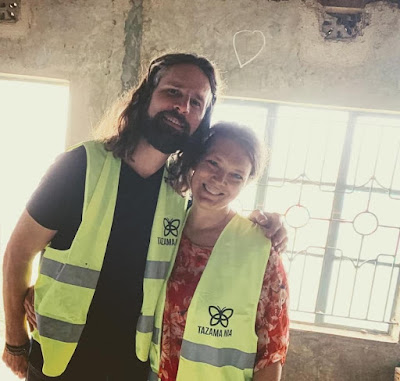Does Every Ministry In Church Have the Same Goal? (6 of 8)
 I had an opportunity to be on staff with a fairly affluent,
influential church for three years where I served for a period both in the
social justice department (helping the poor) and also the missions and outreach
team (church planting).
I had an opportunity to be on staff with a fairly affluent,
influential church for three years where I served for a period both in the
social justice department (helping the poor) and also the missions and outreach
team (church planting).
Over time it became evident that although the social
justice and missions departments had not worked closely together, with time, the
two departments would either duplicate each other’s work or would become inter-dependent. Through conversations and clarifying the vision
it was proposed that they could join together and focus on a common goal, be inter-dependent. After
all, everyone was on the same team and ultimately shared the same goal. We even found that each of the department’s transformational
development strategy and models were similar in their process and context.
- positioning the church for discipleship... more churches planted
Although it was not practically implemented, I saw potential
where the missions department would work more hand-in-hand with social justice
in reaching poor communities. Even to
the point that through social engagements, the church could go into a
particular community to lay a foundation for ministry that could lead to a church. The newly planted church could be a natural
overflow of what God was already doing in that community. In the missions and outreach department, church
planters could be trained to be champions of justice causes and community
transformation, all in the context of planting and pastoring a church.
It was a clear, focused strategy, that could be taught and
multiplied, which could allow for growth and development and with time lead to
effective community social engagements - positioning
the church for discipleship eventually leading to spiritual transformation
and more churches planted.
In this context, possibilities and opportunities for community
engagements are endless and can look different in every area. For some, it might be focused on vocational
training; while others might serve a medical need. The idea is to partner with local leaders,
map a community and focus on the assets or strengths of the community (asset
mapping), in order to together bring transformation.
The ministry targets for church planting and helping the
poor could be focused in the same communities; Targeting the slums or urban communities
in the city, beginning with the church’s networks and current ministry
engagements, pastor’s networks, church plant training and social development
engagements, they all would work together for the sake of the Gospel.
A "justice" department in the church should not be viewed as
the only department that does social
justice but it ought to be seen as the department that helps “the church” (including all ministry
departments) facilitate social justice in all sectors, community outreach,
seeking transformation through discipleship - loving your neighbor.
- Disciples naturally want to be the church
With these departments working together, church planters,
pastors and community workers all are more able to contextualize and be
intentional in the transformation of their own communities. The church has a great chance to stay
relative and be indispensable to their community. The church and the social
engagements have a symbiotic relationship.
The social engagement can help birth and grow a church by making
disciples. Disciples naturally want to
be the church. The social engagement
will help the church stay relative within the community. The church will help
the social engagement stay focused on the commission – “go and make disciples.”
Every ministry should ultimately be focused on making Jesus known. When we look at his life in the gospels (Matthew, Mark, Luke and John), we find him performing miracles to show that he was the promised Messiah. The miracles were not just stand alone incidents for the sake of healing or justice. He got everyone's attention, consistently spoke of the kingdom and prepared his followers, particularly the disciples, to carry on the mission after he was gone. The disciples did not really understand their mission until after Jesus' resurrection and during those last 40 days. But in those 40 days before he ascended into heaven, Jesus clarified the mission, ordained the church to carry it out and promised to send the Holy Spirit as the Helper. In the book of Acts (Acts of the Apostles) the early church apostles adapted well to the needs of the church. They eventually got it! The acts were all done in an effort to make Jesus known, to make more disciples of Jesus. They worked together, every delegated department.
The mission has not changed. Today we are to carry it on. Let's not lose focus and change it. Make Jesus known this Easter.
The church has always struggled to find the balance in
fulfilling the biblical mandate to “go and make disciples”, evangelism, church
planting… and the obedience in
reflecting God’s heart for the poor and needy in the world, such as tackling
social justice issues. Too often we
separate the two “co-missions” and even find that we struggle to accomplish
them individually. We get frustrated and
at times quit because we don’t see the results and even the whole process can
feel awkward. Evangelism can become a
forced event, something we check off of the list when we feel we’ve done enough
that month. The reality is that the
church generally struggles, or has given up completely to evangelize.
On the other hand, the church’s social justice and
philanthropic efforts feel right and good in the moment but also can then essentially
take the gospel, kingdom mentality out them and eventually the church will
question why we do them at all. Actually
many churches get very far down the road and don’t even recognize they have
gone the wrong direction. Most likely
they are a church struggling to grow, struggling in giving and struggling see
the positive effects of their ministry.
-...the church... can quench the voice of the Holy Spirit
The trend that actually occurs is that churches have re-defined
social benevolent causes alone to be the mission of the church. They have replaced the “go and make”
disciples with the caring for “the least of these” and don’t recognize that
they might be somewhat off mission. I
would not hesitate to define this as the church falling into another of the
devil’s schemes. The immediate
gratification that someone, the church, gets from doing good, can quench the voice of the Holy Spirit to the point
that the church acts alone in trying, unsuccessfully, to accomplish the
mission, all the while thinking it is still on mission. The mission is not ruined. Thankfully the Holy Spirit is fully in
control and continues to bring in the Kingdom of God. It just won’t necessarily happen with all of
those he invited in to participate in the mission.
These writings are an effort to piece together the God given
passions for the poor, benevolent programs and philanthropic ideas with the
generally understood ideas of missions, evangelism and church planting. The key is to “position for discipleship” - to put ourselves, as the church, in a place
where we naturally, undeniably will lead in such a way that others will want to
follow us, follow Jesus.
Every ministry should ultimately be focused on making Jesus known. When we look at his life in the gospels (Matthew, Mark, Luke and John), we find him performing miracles to show that he was the promised Messiah. The miracles were not just stand alone incidents for the sake of healing or justice. He got everyone's attention, consistently spoke of the kingdom and prepared his followers, particularly the disciples, to carry on the mission after he was gone. The disciples did not really understand their mission until after Jesus' resurrection and during those last 40 days. But in those 40 days before he ascended into heaven, Jesus clarified the mission, ordained the church to carry it out and promised to send the Holy Spirit as the Helper. In the book of Acts (Acts of the Apostles) the early church apostles adapted well to the needs of the church. They eventually got it! The acts were all done in an effort to make Jesus known, to make more disciples of Jesus. They worked together, every delegated department.
The mission has not changed. Today we are to carry it on. Let's not lose focus and change it. Make Jesus known this Easter.

